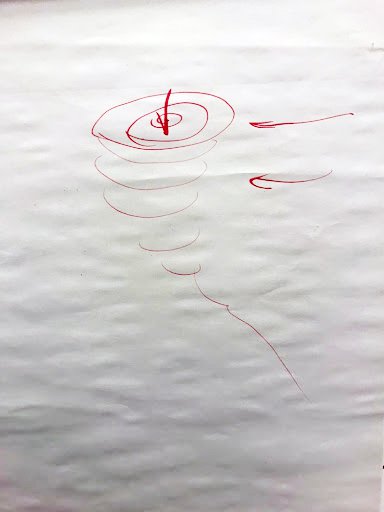
Working with the newest cohort, Brazil, on the Global Innovation Policy Accelerator, Thomas Kohut from Uscreates was outlining key design principles relevant to innovation policymaking. This prompted someone from the Brazilian federal government to stand up and begin drawing on a flipchart:
“In Brazil it’s less of a wall, it’s more like a tornado. The user is in the middle and everything around them is messy, complex. As policymakers we do our best to reach them through all that”

Some of the challenges at the heart of this tornado are focal points for the collaborative projects our Brazilian participants will be working on throughout the Accelerator Programme.
‘Brazil is a continent-sized country’, another participant reminded us.
It has 26 states and a federal district, making it very difficult to make an assessment of its innovation system as a whole. Each state has its own legislature resulting in a complex public administration system. The country is also characterised by regional imbalances in terms of inequality; tech investment, for example, is concentrated in the South East, particularly in Sao Paulo.
Someone else flagged that, like the tornado, policymaking is unpredictable in Brazil in terms of its direction. The country is experiencing a period of challenging political change resulting in policy discontinuity and unpredictability; medium and long term planning is by no means easy.
But there is plenty of opportunity for innovation in Brazil; it is one of the largest economies in the world with plenty of ‘innate core strengths’ to make it a leading innovator. This is why a diverse range of innovation policymakers that span geographies, ministries and agencies have come together to collaborate on the Global Innovation Policy Accelerator.
Over the next nine months they will form teams, develop projects around an innovation policy challenge, and test their ideas to find out which ones can be scaled up. They will gain exposure to the UK innovation system, receive mentoring from experts relevant to their projects, work closely with a coach, and apply new methods such as user-design as part of that journey.
The themes they have chosen to address chime with those we have observed repeatedly both in the UK and in other countries:
The fact that we repeatedly see innovation policymakers face the same challenge reinforces the need to foster more collaboration both internationally and within countries. In practice, it’s a highly demanding, but rewarding, thing to do.
Over the course of the week, teams were tasked with building the foundations of their project, answering key questions through a ‘manifesto’.
Why do we need to innovate? What are our objectives? Where will the value be created? Who do we need to engage in order to be successful… when and how will all this happen?
These are big questions which usually require extensive deliberation, and doing it over the course of a week can feel daunting. We have found that participants’ work priorities don’t always align, given their diverse roles across government. Reaching an agreement for their project’s focus will require each team to figure out how they can best collaborate.
To do so, communication and working styles also come into play, given Brazil’s culturally diverse nature. We asked the cohort to identify their ‘collaboration style’ through a simple test and use this as a starting point to discuss how team members can best support each other.
For example, one of the teams told us they have too many ‘producers’: they are all great at getting things done but less so at ‘exploring’ and coming up with creative solutions. The Accelerator will offer support in this respect through mentoring, for example.
Another team told us that participation in discussions and decisions is not always balanced with conversation being dominated by certain people; so they implemented methods such as ‘silent debates’ and ‘dot-sticker voting’ which are designed to be more inclusive and democratic.
Each team will also regularly meet with a coach, who will support them with effectively managing team dynamics, and troubleshooting challenges they experience over the course of the programme.

Something that really struck us about this cohort is the high levels of engagement they displayed throughout the week and how invested they are in their projects and forming new connections. For these new links to form, and for the network to grow, they stressed to us, you have to allow conversations to happen.
‘Lunch was too short!’
This was perhaps one of the most crucial pieces of feedback we received throughout the week. One of the aspects of the Accelerator participants most value is the opportunity to learn from each other, from speakers, and facilitators: by talking to each other.
Creating opportunities for conversations to happen is a key way of doing this, including through longer lunch breaks! This is particularly relevant for the Brazilian context, its continental size means it’s very rare to get so many innovation policymakers from across the country in the same room.
The Accelerator team also valued the opportunity to have extensive dialogue with the cohort to better understand their hopes and fears for the programme. We collected quickfire feedback at the end of each day through feedback cards and made changes where we could as the week progressed. We will continue to tailor and iterate it so that the teams can have the highest possible impact in their innovation system.
We want to thank the Brazilian cohort for their tireless efforts throughout the week and for truly being present throughout. The hard work has only just started: the teams have now returned to Brazil where they will finalise team roles and begin to research their challenge in more depth. We look forward to welcoming them back in the UK in March next year!
